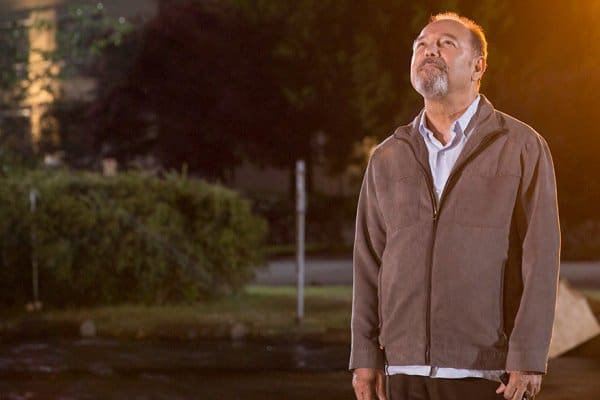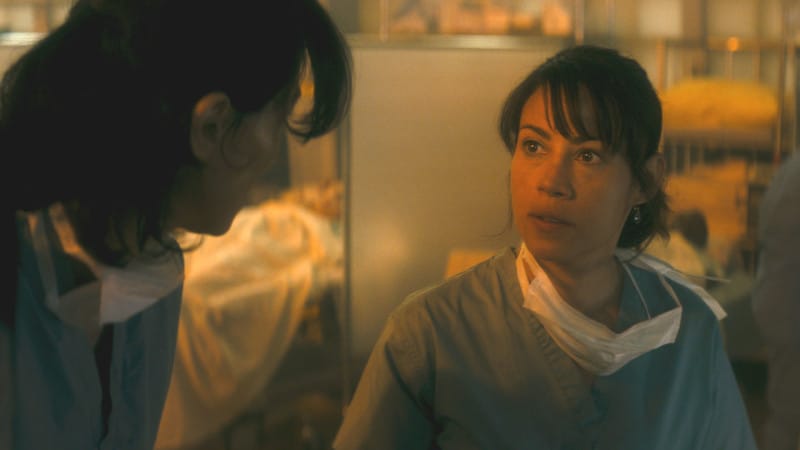Fear The Walking Dead, Season 1, Episode 6, “The Good Man”
Written by Dave Erickson and Robert Kirkman
Directed by Stefan Schwartz
Aired Sundays at 9pm (ET) on AMC
With “The Good Man”, Fear The Walking Dead wraps up its first season, a decidedly mixed bag filled with great imagery and so-so characters. The finale keeps things incredibly brisk, focusing on pushing its story to the next stage and moving the characters toward the world we recognize from The Walking Dead. It’s a bloody hour, one that satisfies in mostly expected ways.
The hour acts largely the way a finale should. It wraps up the season’s storylines, as Travis and Maddie’s family and the Salazars head to the military compound with the goal of retrieving Nick, Liza, and Griselda, leading all of the walkers that were locked in the stadium to the compound, effectively overrunning it.
God this show looks good. There’s a subtlety to the direction of this show that is both surprising and wonderfully satisfying. There are at least five long shots of Los Angeles in this episode that are chilling and haunting. These are the kind of shots that encapsulate the show’s themes without the need for dialogue or sound of any kind. The episode’s final shot is almost disturbingly beautiful, one that seems to suggest hope where it has just been entirely destroyed.
Things really get underway when Daniel walks up to the gate of the compound. He leads the 2,000 walkers with such nonchalance it almost seems unreal, but of course, Ruben Blades pulls it off. This distraction is Daniel’s idea, and it’s a great step toward illustrating the kind of self-interest that is required to live in a world without law.
Strand understands this self-interest better than anyone. His breakout with Nick is not a merciful one. He leaves everyone else locked up, understanding that these people are not valuable to him in anyway and may in fact detract from his attempts to survive. Strand’s house is awesome, as is his eventual plan to board Abigail, which we come to realize is his boat.
This idea is prominent throughout the episode. Chris and Alicia discuss it as they wait for the adults outside the compound. Chris hates the idea of having to save only those he loves. He thinks it’s possible to save everyone. Alicia knows better. She’s proven right by the arrival of soldiers looking for a lift, ones that end up assaulting Chris, threatening Alicia sexually, and stealing their car. It’s never been possible to save everyone, and now it’s impossible to even think about it.
Travis’s story becomes the focal point this week, and it suddenly feels as though it has really been the main story all season long. Initially, he struggles with releasing Andy, the soldier Daniel received his information from last week. When he eventually does, and the decision ultimately leads to Ophelia being shot, we finally see Travis unhinged. He beats Andy far past submission. He destroys the man, and Travis begins to grasp the harshness of the world around him.
The episode’s final moments also focus on Travis. Liza’s infected, and she knows there is nothing she can do to save herself. She asks Maddie to kill her, but Travis stumbles on them before she can complete the job. Travis pleads with Liza. Surely there must be something they can do. We know there isn’t, just like Liza does, but it’s still chilling to see this reality break over Travis’s face. His world is shattered here. Really, he’s just catching up with everyone else. But in doing so, he leaves behind some part of himself. The virtuous part.
The episode’s final moments are undoubtedly overwrought. They play up this moment and it becomes manipulatively emotional. In spite of all of this, though, it still works. It’s a moment that depicts Travis’s soul corrupting, and it works to re-contextualize the somewhat bland performance Cliff Curtis has delivered up to this point. This performance suddenly seems intentional. Travis is unexciting, a boring high school teacher who lives a completely normal life. He’s been trying remain that Travis all season. He still thinks it’s possible, until this moment.
This episode positions Fear The Walking Dead as an entirely different show than its predecessor. If the Abigail turns out, the show will be entirely walker free next season. Instead, it will become a show about its characters, which is what it has always wanted to be. The show’s season finale cemented this. Fear The Walking Dead is much more interested in character, and much less interested in thrills. It’s a show that wants its viewers to feel something, to understand what it would feel like for normal people to be forced into a world that’s falling apart. The first season is not perfect. Its first four episodes are remarkably slow and its final two may have been too heavily plotted. Ultimately, though, the season is worth watching and its biggest surprise is its remarkable dissimilarity to its predecessor. In an era of sequels and prequels, that’s pretty cool.


